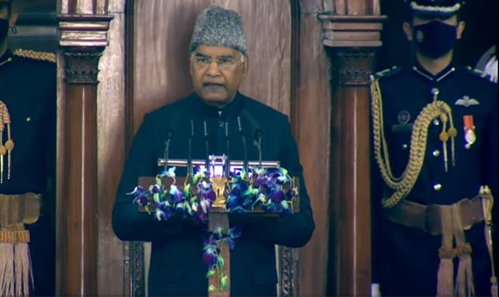New Delhi, Jan 31: President Ram Nath Kovind on Monday appreciated the vision of the government for the success of the country’s Unified Payments Interface (UPI) platform in the context of Digital India and the growing spread of the digital economy.
On the first day of the Budget Session of Parliament, the President addressed the joint sitting and said, “I would also appreciate the vision of the government for the success of the country’s UPI platform in the context of Digital India and the growing spread of the digital economy. In December 2021, more than eight lakh crore rupees have been transacted through UPI in the country.”
The President of India also said that the government has given training to thousands of women self-help group members to include them as ‘Banking Sakhi’.
“Government has given training to thousands of women self help group members to include them as ‘Banking Sakhi’. These women are working towards connecting banking services to the rural areas,” said President Kovind.
In a move to enhance the internet connectivity in the country, President informed that the government is working on developing 5G that is fifth-generation wireless technology.
“India is one of the nations that has the cheapest internet and mobile phones. We are also working on developing 5G. Our PLI Scheme on semi-conductor will further boost our startups ecosystem,” said President.
The President added, “The government has relaxed various norms in the patents and Trademarks sector and therefore we have already witnessed 6,000 applications for patents and 20,000 applications for Trademarks in the FY 2021-22.”
Economic Survey 2021-22 and the Statistical Appendix will be laid on the table of the Lok Sabha at around 12.45 pm by Union Finance Minister Nirmala Sitharaman while it will be tabled in Upper House a few minutes after the House assembles at 2.30 pm.
The Budget Session of the parliament commenced on January 31 with President Ram Nath Kovind’s address. The first part of the Union budget session of Parliament will be held from January 31 to February 11 and the second part of the budget session will take place from March 14 to April 8. (Agencies)


